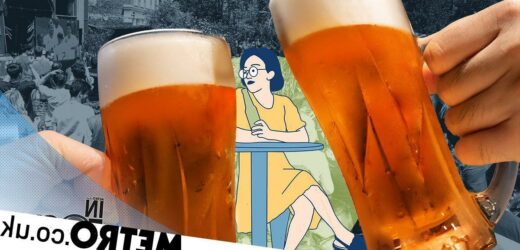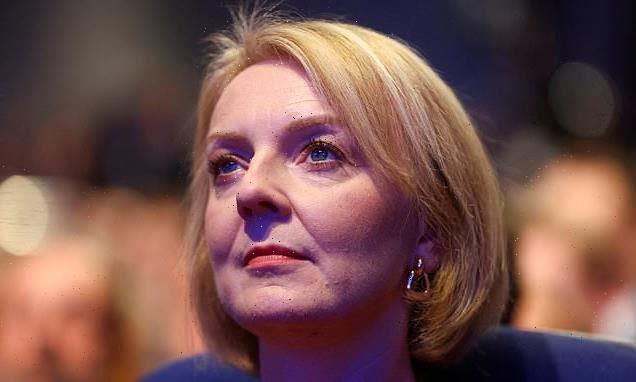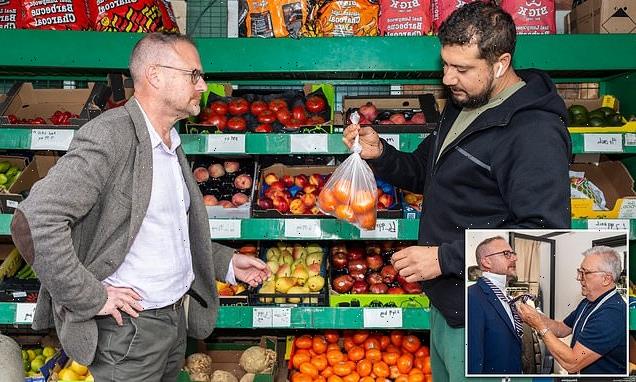‘Tell your boobs to stop staring at my eyes.’
That’s the slogan Harriet Edgar saw on a man’s t-shirt at a beer festival last month.
‘He shouldn’t have been allowed in wearing it,’ the 32-year-old tells Metro.co.uk. ‘Things like that are just a kick in the teeth to see – has no progress been made?’
For over 14 years, Harriet, who lives in Newcastle Upon Tyne, has been attending beer festivals. She says that this derogatory, sexist behaviour towards women and their bodies ‘has been “normal” culture’ for as long as she’s been attending them.
‘Everyone has a story, the whole culture needs changing. I don’t know how we do that, but change needs to come,’ she says.
With Oktoberfest currently in full swing across London, as well as many other parts of the UK and the world, the iconic festival, which is reminiscent of the annual beer festival born in Munich in 1810, is a celebration of German beer served in two-pint steins, music, and food.
Think Oktoberfest and it’s hard to escape the well-worn images of men in lederhosen and women in traditional ‘wench-like’ costumes at the forefront.
This year, managers of the event have already hit headlines after being embroiled in a sexism row for banning a party song from its festivals. The number-one single Layla, by DJ Robin & Schürze is about a ‘sexy, brothel mama’ and has remained in the German charts for 19 weeks, featuring the lyrics: ‘I have a brothel and the brothel mama’s called Layla’ and ‘beautiful Layla, she’s prettier, younger, sexier.’
Layla is described as having a ‘sexy figure, blonde hair’ and is called a luder – translated into English as anything from ‘bait’ and ‘hussy,’ to ‘slut’ and ‘bitch’.
While festival-goers petitioned against so-called censorship, asking to #freelayla – attracting more than 50,000 signatures – the issue of derogatory terms and sexist, misogynistic behaviour against women prevails. Both in society, and at beer festivals – and women in the beer industry have had enough.
Like any beer festival, settings that serve alcohol are a hotbed for crimes against women – and likely have been for as long as ale has been poured, except, hardly anyone has talked about it.
‘I have experienced comments and touching at every beer festival I’ve been to,’ Charlotte Cook, from London, tells Metro.co.uk.
‘I’ve seen women being harassed, touched, belittled, and I know some who have been assaulted. I’ve had men put their hands in my face to tell me to shut up. I’ve been told my clothing isn’t appropriate. I’ve been propositioned by men I’ve just met.
‘The most unpleasant thing that happened wasn’t at a beer festival, but was at an industry event with my peers,’ adds the 33-year-old head brewer at Coalition Brewing. ‘I had my drink spiked and I was raped by a stranger. I went through the procedures, but with no memory or witnesses the only course of action was a DNA profile.’
After an ‘incredibly invasive and unpleasant forensic examination’ the DNA didn’t match anything on the Police’s nationwide database, and so no further progress could be made with Charlotte’s case.
‘I went through lots of intensive therapy, moved city and left my job because I couldn’t cope with the burning emotions inside of me, and maintain a head brewer job,’ she recalls. ‘My brain was utterly destroyed and the anger and stress from it all was overwhelming, it changed my life and caused huge problems for me for years.
‘It is the worst thing that’s ever happened to me.’
According to a 2021 UN Women UK YouGov survey, 71% of all women in the UK have been sexually harrassed in a public place – and over half (55%) didn’t think the incident was ‘serious enough to report’.
As a result, campaign groups and local police forces have invested in initiatives in order to protect women and girls from harassment and abuse in such settings – one example is the Metropolitan Police’s ‘Ask for Angela’ campaign.
Posters for the scheme can be found on the back of (usually women’s) toilet doors in pubs, bars, restaurants and breweries – helping someone quickly and quietly escape a situation if a date ‘doesn’t feel right.’
‘People who feel unsafe, vulnerable or threatened can discreetly seek help by approaching venue staff and asking them for ‘Angela’,’ a Metropolitan Police spokesperson tells Metro.co.uk. ‘This code-phrase will indicate to staff that they require help with their situation and a trained member of staff will then look to support and assist them.’
However, the concern with this method is that this leaves a potential perpetrator in the situation – with an undercover Metro.co.uk reporter revealing that the scheme often didn’t work, and (though strongly advised) wasn’t mandatory in such settings.
The Met’s chief licensing officer Ian Graham tells Metro.co.uk that Ask For Angela has been offered to ‘many festivals and large events’ – and ‘any operators wanting training can speak to their local police licensing team to arrange.’
‘We also continue to proactively police the wider environment around the night time economy and at large public events with the intention of identifying offender behaviours and reducing violence against women,’ he adds.
Except, despite this, according to a 2021 YouGov survey, 81% of women still want improved safety in bars and clubs, compared to 70% of men.
‘I have never felt fully safe at a pub or festival,’ admits Charlotte. ‘Even last week I was kissed on the side of my head by a stranger sitting next to me at a pub. I hate beer festivals and beer events now, and I try to avoid them where I can.’
While statistics show that most women want more enforced, improved safety measures in settings that serve booze – hardly anyone is listening, leaving beer festivals rife with sexism and derogatory behaviour that’s getting swept up under soggy, age-old beermats.
‘I couldn’t tell you when I first experienced sexism at a beer festival,’ Ellie King, 38, tells Metro.co.uk. ‘It’s just always been there. Subtle and insidious. A pervasive part of drinking culture.
‘Walking into a beer festival is like walking into a packed pub but amplified – it’s nerve wracking,’ adds the bartender and freelance festival coordinator.
Ellie shares that she ‘steels herself’ for what might come her way. ‘Anything from the overly familiar “darling”, “love”, “sweetheart” comments to surprise over what, or how much, you are drinking, to being so painfully, shamelessly looked up and down; hands on waists or hips as you move through crowds,’ she explains.
‘The weird compulsion some men have to tell you what they think you look like to them (good or bad) is baffling, embarrassing and uncomfortable, and makes you feel so exposed.’
Ellie admits that having to go through such an ordeal makes her feeling ‘exhausted’ as well as ‘vulnerable, on edge and anxious’. Ultimately, she says, she feels ‘unsafe as there is often no support’ for her when she attends beer festivals.
‘Even what people wear can be confrontational and make you feel uncomfortable,’ adds Ellie, echoing Harriet’s experiences. ‘At a festival a few weekends ago my friend pointed out a guy wearing a t-shirt that said: “I’m a simple man” and had a picture of a pair of boobs, a can of beer and a motorbike.’
A t-shirt may seem ‘harmless’ to some, but belittling and reducing women to ‘a pair of boobs’ potentially normalises derogatory attitudes to women, making despicable harassment and catcalls acceptable behaviour at such events – behaviour that’s often seen as ‘laddish’ or ‘just for a bit of fun’.
Ellie says: ‘I still see this kind of behaviour towards women in beer spaces regularly. It comes from an ingrained sense of male superiority where women are conditioned to be flattered by male attention, regardless of its intent.’
As a result, a man once told her that she needed ‘a good shag to deal with her attitude,’ and suggested that she wasn’t ‘attractive enough to work behind a bar’.
Amelie Tassin, 41, director at Tipple Marketing, has worked in the beer industry for 15 years and claims that, as far as she remembers, she’s ‘always experienced’ sexism at beer festivals.
She recalls being ignored at her first ever beer festival that she attended with her ex-husband – ‘there was no way I could have an opinion or even a desire to try the beers which were systemically served to him and never me,’ she tells Metro.co.uk.
‘Women are not seen as legitimate in beer spaces. I have sometimes heard people saying that women were coming to pubs or beer festivals to ‘find a boyfriend’ or worse ‘to be shagged.’
Amelie also remembers being ‘quite vocal on some occasions’ about derogatory behaviour but was told: ‘He’s like that, don’t make a scene.’
‘Most of the time, there was no possibility (that I know of) to report this kind of behaviour to anyone,’ she adds.
Every woman Metro.co.uk spoke to echoed Amelie’s comments in that reporting such instances of sexism and sexual harrassment at beer festivals was difficult, or that a process simply didn’t exist. That such behaviour and crimes against women had been ‘normalised’ to the extent that women simply accepted it, ignored it, and ‘didn’t make a big deal.’
It goes hand-in-hand with reports discovering that 96% of all women who have been sexually assaulted never reported it to the police – with less than half (45%) believing that reporting it wouldn’t change anything. Shockingly, these women believed that instances of groping, being followered or coerced into sexual activity wasn’t serious enough.
‘Pubs have traditionally in this country been male dominated spaces with female bar staff brought in to act as ‘entertainment’ for the punters, something nice to look at. It’s normalised because we live in a patriarchy and it’s “the way it’s always been”,’ says Ellie.
Meanwhile, Charlotte adds: ‘Women are seen as objects to be used as a means to an end, not as people in their own right.
‘Women in beer are far outnumbered by men, and so the critical mass is out of balance and so women do not enjoy parity in this industry.’
Amelie also suggested that ‘the objectification and sexualisation of women in advertising or on beer labels’ has encouraged sexual harassment, or its normalisation and acceptance at beer festivals to date.
In 2019, the Campaign for Real Ale (CAMRA) group banned sexist beer names and imagery from its flagship London beer festival, the Great British Beer Festival – 42 years into its history.
While buxom, scantily clad women no longer feature on pump clips and labels, alongside names such as ‘Village Bike’, ‘Leg Spreader’ and ‘Slack Alice’ – once described as a ‘little tart’ of a cider – discriminatory attitudes unfortunately prevail, as this year’s event received two complaints for sexism and harassment.
‘It was of course disappointing to hear that not everyone had a positive experience,’ Catherine Tonry, CAMRA member and one of the festival organisers, tells Metro.co.uk. ‘Even one complaint is one too many when it comes to the standards that we must set ourselves.
‘In retrospect, it is clear that small changes could have helped prevent or mitigate those circumstances – such as ensuring that we had an attendee code of conduct as an entry requirement for our festivals and a clear complaint procedure on-site.’
While CAMRA told us that many of its security stewards are Security Industry Association accredited and badged, it admitted that they needed to be clearly identified on site, at festivals, and that they’re there to help – with any matter.
‘We are very aware that when issues of this nature occur it is the under-represented communities that feel the effects the most,’ Tonry says, pointing out that the 51-year-old beer group had launched its Inclusivity, Diversity and Equality review across the campaign as a result, gathering evidence and experiences from under-represented voices ‘to enact positive change across CAMRA.
‘Unfortunately, sexism and inappropriate behaviour has been endemic at beer festivals and across the industry as a whole for decades. We’ve seen some positive steps taken over the last 5-10 years with women actively working to reclaim beer as their own, fight back at sexist marketing tactics and speak up when harassment takes place.
‘But the fight is not just for female beer drinkers to undertake lead on,’ Tonry adds. ‘The whole industry must come together to condemn inappropriate behaviour and create safe spaces and avenues for complaints so that women know that it isn’t something that needs to be tolerated and ‘put up with’.’
One person that’s also determined to make beer festivals safer is 38-year-old Pip Young, brewery manager for SALT Beer Factory, as well as founder and managing director of The Coven, an initiative that champions women within the beer industry.
‘I knew I wanted to do something,’ Pip tells us, adding that she has experienced sexism at every single beer festival she’s attended. ‘Be it small and micro aggressive in nature, to down right abusive.
‘Simply moaning about incidents myself and my peers were faced with wasn’t enough.’
So, Pip set up The Coven, not only to support female owned and brewed beer, but also advocate for women’s safety at events, launching the initiative at the Leeds International Beer Festival in September 2021.
This year, at the same festival, the project also introduced its wellness officers programme with people who are first aid and mental health trained, as well as active-bystanding.
‘We are ultimately hoping to change the culture surrounding beer and, until all are safe and welcomed by the minority who unfortunately set the tone for the majority, we shall be there to intervene,’ Pip explains.
‘We are not bouncers, and not the fun police. The majority of people in the beer world are good people, but also the majority of them are men, and therefore are not affected by this issue.’
‘The presence of The Coven wellness officers at Leeds International this year was very welcome,’ Ellie says. ‘It’s not about policing people’s behaviour, it’s about offering safe spaces and environments for everyone.’
‘Society needs to change,’ Charlotte adds. ‘Women need to be protected as a whole, not just deal with events after the fact. Young men are taught about their exceptionalism, and notches on the bedpost are a source of pride.
‘We need to teach our boys to respect women and girls and view them as equals, not conquests.’
Cheers to that.
Do you have a story you’d like to share? Get in touch by emailing [email protected]
Share your views in the comments below.
Source: Read Full Article




